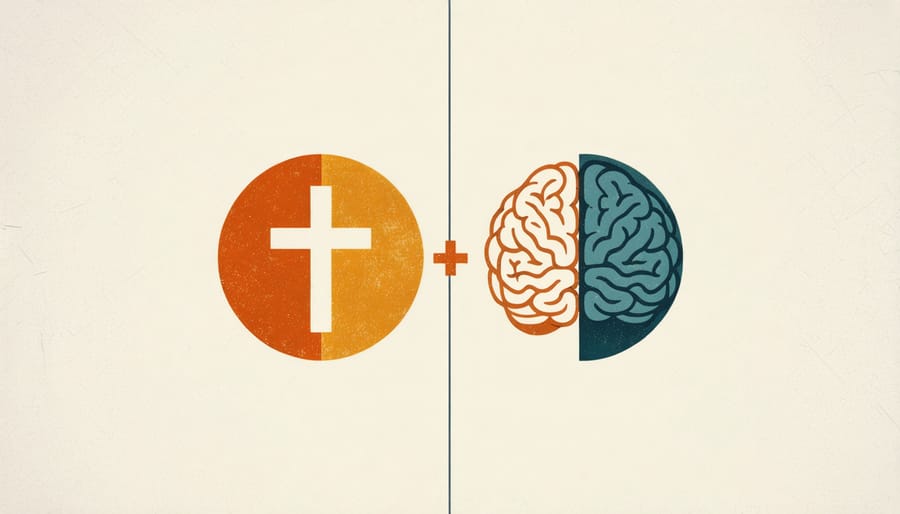Faith-based Cognitive Behavioral Therapy (CBT) bridges the transformative power of biblical truth with clinically proven therapeutic techniques, offering Christians a uniquely integrated approach to mental wellness. Through this gospel-centered therapy approach, believers learn to align their thoughts and behaviors with Scripture while benefiting from evidence-based psychological principles that have helped millions overcome anxiety, depression, and other mental health challenges.
The integration of faith and psychological science creates a powerful healing framework that speaks to both the heart and mind. Just as Philippians 4:8 instructs us to focus on whatever is true, noble, right, pure, lovely, and admirable, faith-based CBT equips believers with practical tools to capture negative thoughts and replace them with God’s truth. This approach acknowledges that true healing encompasses both spiritual and psychological dimensions, allowing Christians to address mental health concerns while deepening their relationship with Christ.
By combining biblical wisdom with proven therapeutic techniques, faith-based CBT offers a comprehensive path to emotional and spiritual well-being that honors both clinical excellence and Christian faith. This integration provides believers with hope-filled strategies that are both scientifically sound and spiritually nurturing.
The Biblical Foundation of Faith-Based CBT

Scripture and Thought Patterns
The Bible provides numerous verses that directly address the transformation of our thoughts and the renewal of our minds, forming a strong biblical foundation for faith-based CBT. Romans 12:2 powerfully instructs us to “be transformed by the renewing of your mind,” highlighting God’s emphasis on cognitive transformation. This aligns perfectly with CBT principles of identifying and changing unhealthy thought patterns.
Philippians 4:8 guides believers to focus their thoughts on “whatever is true, whatever is noble, whatever is right, whatever is pure, whatever is lovely, whatever is admirable.” This verse essentially provides a biblical framework for cognitive restructuring. Similarly, 2 Corinthians 10:5 speaks about “taking captive every thought to make it obedient to Christ,” which parallels CBT’s practice of examining and challenging negative thoughts.
The wisdom literature also addresses thought patterns, with Proverbs 23:7 stating, “For as he thinks in his heart, so is he.” This ancient biblical insight aligns with modern understanding of how our thoughts influence our behaviors and emotions. These scriptures demonstrate that the practice of examining and transforming our thoughts has always been part of God’s plan for our emotional and spiritual well-being.
God’s Promise for Mental Well-being
Throughout Scripture, God provides abundant promises for our mental and emotional well-being. Isaiah 41:10 reassures us, “Fear not, for I am with you; be not dismayed, for I am your God.” This divine commitment to our psychological health forms the foundation of faith-based cognitive behavioral therapy, showing us that building spiritual resilience is part of God’s plan for our lives.
The Bible offers numerous examples of emotional healing and mental restoration. In Philippians 4:6-7, we’re reminded to “be anxious for nothing, but in everything by prayer and supplication, with thanksgiving, let your requests be made known to God.” This passage illustrates God’s invitation to bring our mental struggles before Him, promising peace that surpasses understanding.
God’s word acknowledges the reality of emotional pain while offering hope and healing. Psalm 34:17-18 tells us that “The Lord is close to the brokenhearted and saves those who are crushed in spirit.” This compassionate understanding of human suffering provides comfort and validates the importance of addressing mental health through both faith and practical therapeutic approaches.
Integrating Faith with CBT Techniques

Prayer-Enhanced Cognitive Restructuring
Prayer can powerfully enhance the cognitive restructuring process by inviting God’s wisdom and presence into our thought transformation journey. When challenging negative thoughts, begin by acknowledging them before the Lord, just as David openly expressed his struggles in the Psalms. This practice of using faith as a coping mechanism creates a sacred space for honest self-reflection and divine guidance.
Start by identifying a troubling thought and writing it down. Then, pray specifically about this thought, asking God to help you see it through His eyes. Use Scripture as a foundation for replacing distorted thoughts with God’s truth. For example, if you’re thinking “I’m worthless,” respond with prayer: “Lord, Your Word says I am fearfully and wonderfully made (Psalm 139:14). Help me embrace this truth about myself.”
Consider using the PRAY method for cognitive restructuring:
Present the thought to God
Reflect on relevant Scripture
Ask for divine wisdom
Yield to God’s perspective
This approach combines traditional CBT techniques with spiritual practices, allowing you to address both psychological and spiritual aspects of thought patterns. Remember Philippians 4:8, which encourages us to focus on whatever is true, noble, right, pure, lovely, and admirable. This verse provides an excellent framework for restructuring thoughts in alignment with God’s truth.
Scripture-Based Behavioral Activation
Scripture-based behavioral activation draws upon biblical wisdom to encourage positive actions and healthy lifestyle choices. The Bible provides numerous examples of how activity and purposeful living can lift our spirits and strengthen our faith. As Philippians 4:9 teaches us, “Whatever you have learned or received or heard from me, or seen in me—put it into practice. And the God of peace will be with you.”
This approach involves identifying and engaging in meaningful activities that align with Christian values and promote emotional well-being. These might include serving others, participating in church activities, engaging in regular prayer and devotional time, or pursuing God-honoring hobbies and relationships.
The method is particularly powerful because it combines clinical effectiveness with spiritual growth. For instance, when feeling discouraged, we might draw inspiration from James 1:22, which calls us to be “doers of the word, and not hearers only.” This scripture encourages us to take action rather than remain passive in our faith journey.
Practical applications might include:
– Starting each day with prayer and Bible study
– Joining a church ministry or volunteer program
– Maintaining a gratitude journal focused on God’s blessings
– Engaging in regular fellowship with other believers
– Setting and pursuing goals that honor God
By intentionally choosing activities that reflect our faith values, we create a positive cycle of behavior that enhances both our spiritual and emotional health.
Christian Mindfulness Practices
Christian mindfulness practices offer a sacred approach to present-moment awareness, rooted in biblical principles and contemplative traditions. Unlike secular mindfulness, these practices center on deepening our relationship with God through focused attention and spiritual reflection.
One fundamental practice is Scripture meditation, where believers slowly read and contemplate Bible verses, allowing God’s Word to transform their thoughts and hearts. As Psalm 119:15 reminds us, “I meditate on your precepts and consider your ways.”
Contemplative prayer, another essential practice, involves sitting quietly in God’s presence, focusing on His attributes and love. This form of prayer helps quiet anxious thoughts while strengthening our spiritual connection. Jesus himself modeled this by often withdrawing to quiet places for prayer and communion with the Father.
The practice of sacred breathing involves breathing slowly while focusing on God’s presence, perhaps silently repeating a short scripture or “Jesus Prayer.” This can help manage stress while maintaining a Christ-centered perspective.
Gratitude meditation encourages believers to intentionally focus on God’s blessings and faithfulness, fostering a positive mindset aligned with Philippians 4:8: “Whatever is true, whatever is noble, whatever is right, whatever is pure… think about such things.”
These practices, when integrated with CBT techniques, create a holistic approach to mental wellness that honors both psychological science and Christian faith, helping believers renew their minds as described in Romans 12:2.
Practical Applications in Daily Life
Daily Devotional Exercises
Daily devotional exercises in faith-based CBT combine scripture meditation with practical cognitive restructuring techniques. Each exercise typically begins with a focused Bible reading, followed by guided reflection and therapeutic exercises that align with Biblical approach to well-being.
Start your day by selecting a relevant scripture verse, such as Philippians 4:8: “Finally, brothers and sisters, whatever is true, whatever is noble, whatever is right, whatever is pure, whatever is lovely, whatever is admirable—if anything is excellent or praiseworthy—think about such things.” Use this verse as a foundation for identifying and challenging negative thought patterns.
Create a thought journal that includes three columns: Situation, Automatic Thoughts, and God’s Truth. When facing challenging situations, record your initial reactions, then search scripture for relevant truths that counter destructive thinking patterns. For example, when feeling overwhelmed, recall Isaiah 41:10: “Do not fear, for I am with you.”
Incorporate prayer throughout these exercises, asking for divine guidance in transforming your thought patterns. Practice gratitude by listing three blessings daily, connecting them to specific Bible verses. End each session with a moment of quiet reflection, allowing God’s wisdom to reinforce the cognitive strategies you’ve learned.
These structured activities create a powerful synergy between faith-based wisdom and proven psychological techniques, fostering both spiritual growth and emotional healing.

Community Support Integration
In faith-based CBT, the church community plays a vital role in supporting and strengthening the healing journey. As Scripture reminds us, “Bear one another’s burdens, and so fulfill the law of Christ” (Galatians 6:2). This integration of community support provides a nurturing environment where individuals can find encouragement, accountability, and practical assistance while working through their therapeutic process.
Small groups and prayer partners often serve as valuable support systems, offering safe spaces for sharing struggles and victories. These fellowship opportunities allow individuals to practice new cognitive skills while receiving biblical encouragement from others who understand both the spiritual and psychological aspects of their journey.
Many churches now offer support groups specifically designed to complement faith-based CBT, where participants can discuss their challenges within a Christian framework. These groups often incorporate scripture meditation, shared prayer time, and practical application of therapeutic techniques through a biblical lens.
The involvement of pastoral care teams can also bridge the gap between clinical sessions and daily life. Trained pastoral counselors and lay leaders can reinforce therapeutic concepts while providing spiritual guidance that aligns with the individual’s faith journey. This collaborative approach creates a comprehensive support network that addresses both spiritual and emotional needs.
By involving the church community, individuals benefit from the powerful combination of professional therapeutic techniques and the sustaining strength of Christian fellowship, creating a holistic approach to healing and growth.
Building a Sustainable Practice
Creating Sacred Space
Creating a sacred space for faith-based CBT involves intentionally setting aside both physical areas and specific times for your healing journey. Just as Solomon built a temple dedicated to worship, we too can designate a special place for our therapeutic practice. This space should be free from distractions and filled with elements that remind you of God’s presence – perhaps a Bible, a cross, or meaningful Christian symbols.
Consider Psalm 46:10, which tells us to “Be still, and know that I am God.” Your sacred space should facilitate this stillness, whether it’s a quiet corner in your bedroom, a comfortable chair in your study, or even a peaceful spot in your garden. Some find it helpful to light a candle, play soft worship music, or keep a prayer journal nearby.
Establishing regular times for practice is equally important. Just as Daniel prayed three times daily, setting consistent appointments for your faith-based CBT work helps build a sustainable routine. This might mean early morning sessions before the household wakes, a lunch break devoted to reflection, or evening sessions when the day’s activities wind down. Remember, this time is holy ground – a space where healing, growth, and divine encounter can flourish.
Maintaining Consistency
Maintaining consistency in faith-based CBT requires intentional daily practices that combine spiritual disciplines with therapeutic techniques. Start each day with a dedicated prayer time, asking God for guidance and strength in managing your thoughts and behaviors. As Philippians 4:8 reminds us, “Finally, brothers and sisters, whatever is true, whatever is noble, whatever is right, whatever is pure, whatever is lovely, whatever is admirable—think about such things.”
Create a structured routine that includes Bible reading, journaling, and thought monitoring. Set aside specific times for these activities, just as you would for any important appointment. Consider using a prayer journal to track both your spiritual journey and your cognitive patterns, noting how biblical truths help reshape challenging thoughts.
Stay connected with your faith community and accountability partners who can support your journey. Regular church attendance, small group participation, and fellowship with other believers can reinforce positive thinking patterns and behaviors. Remember that transformation is a gradual process that requires patience and persistence. As Romans 12:2 teaches, we are “transformed by the renewing of your mind,” which happens through consistent practice and divine grace.
Faith-based CBT offers a powerful path to healing and growth by combining proven psychological techniques with the timeless wisdom of Scripture. As we’ve explored throughout this article, this approach provides a comprehensive framework for addressing mental health challenges while staying rooted in Christian faith.
Remember that God’s word tells us to “be transformed by the renewing of your mind” (Romans 12:2), and faith-based CBT provides practical tools to achieve this transformation. By integrating biblical truth with therapeutic strategies, you can develop healthier thought patterns, stronger emotional resilience, and a deeper connection with God.
Whether you’re struggling with anxiety, depression, or other mental health challenges, know that seeking help through faith-based CBT is an act of wisdom and self-care. Just as David poured out his heart in the Psalms, you too can find healing through honest dialogue with God and evidence-based therapeutic techniques.
As you begin your journey with faith-based CBT, remember that progress takes time and patience. Start small, perhaps by identifying one negative thought pattern and replacing it with a biblical truth. Seek support from qualified Christian counselors who can guide you through this process while honoring your faith.
Trust that God is with you every step of the way, working all things together for your good (Romans 8:28). Your mental health journey matters to Him, and through faith-based CBT, you can experience renewal and transformation in both mind and spirit.
